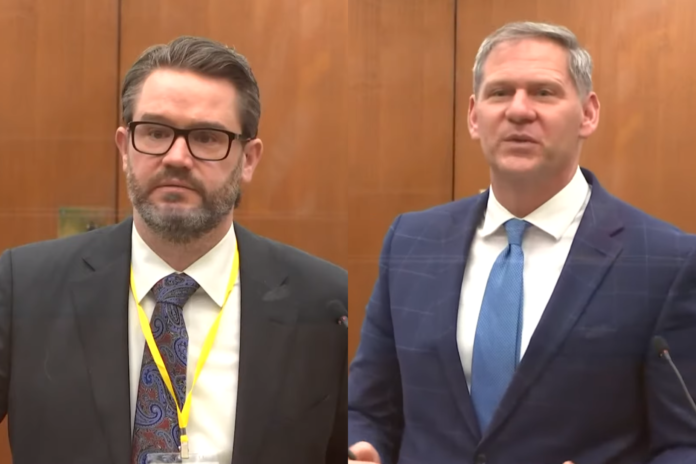(Power Line) — Jury selection continued for a second day, starting with prospective juror number 20. Although he understands that the case is “a big deal,” he professed no concerns for his physical safety if he were to sit as a juror. He finds the anonymity with which Judge Cahill is shrouding the jurors to be comforting. How long can such anonymity last in the age of social media? He manages a national sales team of 20 for the company that employs him. When both defense counsel Eric Nelson and deputized prosecutor Steve Schleicher passed him for cause, we had our fourth juror and I thought we were on a roll.
Next up was prospective juror number 23. He works for a marketing company and has lived in the Twin Cities for 40 years. He too expressed no concerns for his personal safety. He wants justice to be served in the case and was willing to participate as a juror to produce “a fair outcome.” He saw the “protests” that followed George Floyd’s death on television last summer. However, he “didn’t see any usefulness to it.” He didn’t see anything useful in “burning Lake Street.” That was enough for Mr. Schleicher. The State exercised a peremptory strike to get him out of there.
And so it went. Nelson struck prospective juror number 26. He also professed no concern for his safety if he were to serve, but he seemed oriented to the perspective of the prosecution in the case, as seems to reflect the norm in Hennepin County.
Prospective juror number 27 is a multilingual immigrant. He came to the United States — I think from somewhere in Francophone Africa — 14 years ago. He works in IT. He loves technology. He expressed no concern for his physical safety. He said he wants to serve as a juror to make the justice system work. In response to questions posed by Schleicher, he stated he disagrees with proposals to defund the police. Passed for cause by both sides, he is our fifth juror in the case.
Prospective juror number 28 is in real estate sales. He expressed no concern for his physical safety. He stated in his juror questionnaire and in his response to Nelson’s questions that he has a very negative opinion of defendant Derek Chauvin. He is an advocate of police reform. His daughter participated in marches last summer. If he served on the jury and rendered a not guilty verdict he would disappoint her. I thought he would be a difficult juror for Chauvin and Nelson used his fourth peremptory challenge to strike him.
Prospective juror number 29 was a practicing lawyer early in her career. She wanted to serve on the jury. She projected an air of neutrality about the facts of the case. She said she needs to know more about “police protocols.” Schleicher struck her.
Juror number 30 loves music and works in a leadership position on the lay staff of a mid-size local church. His view of Chauvin is “very negative.” He thinks Chauvin murdered George Floyd. He reflects the full boat “social justice” mentality that afflicts Minneapolis. He was an obvious nightmare for the defense. Nelson tried manfully to get him stricken for cause but had to use another peremptory challenge to strike him.
At the end of the day we had two more jurors and word that the Minnesota Supreme Court had denied review of the Court of Appeals decision ordering Judge Cahill to consider reinstatement of the third-degree murder charge under the Noor case. When the lawyers appear before him this morning at 8:00, they will take up the question of how to proceed on the third-degree charge with Judge Cahill. My understanding (partial guess) is that the third-degree charge is coming back into the case when the Court of Appeals decision becomes final and the trial court reacquires jurisdiction over the issue. Whether the third-degree charge remains viable will not be determined until the Minnesota Supreme Court decides the Noor case itself later this year.
Last night Tucker Carlson opened his show with an overview of the death of George Floyd and the resulting maelstrom (video below). He took up the questions of fact that are basic to the case. He closed the segment with my own reflections on the mob factor that troubles my thoughts about the case.

















